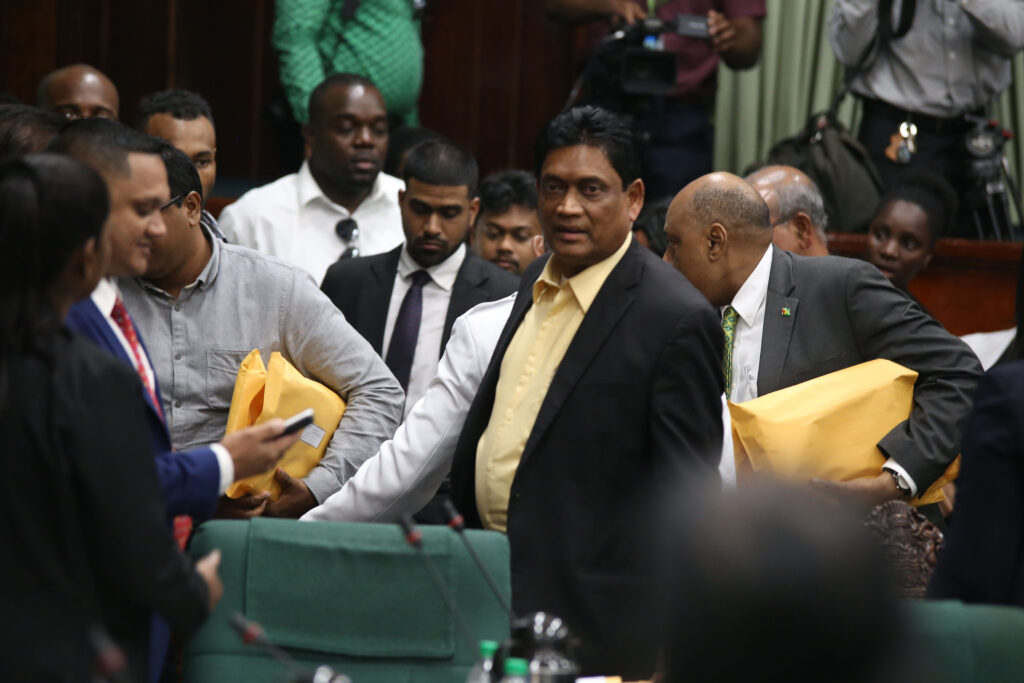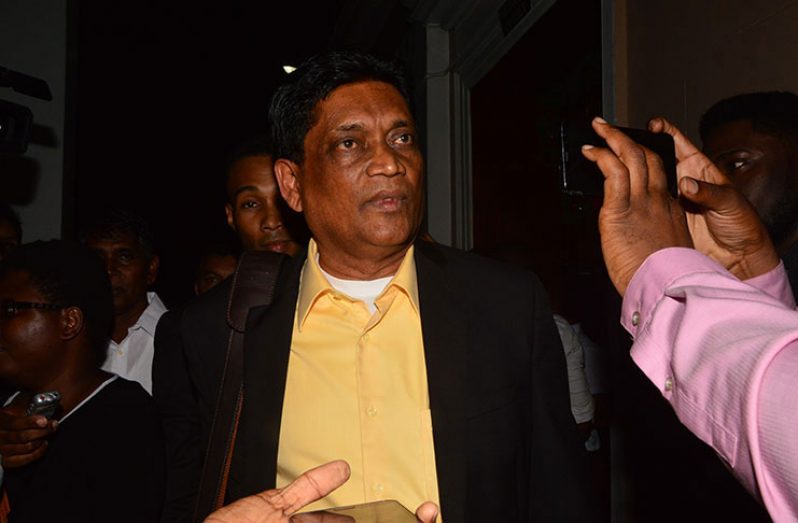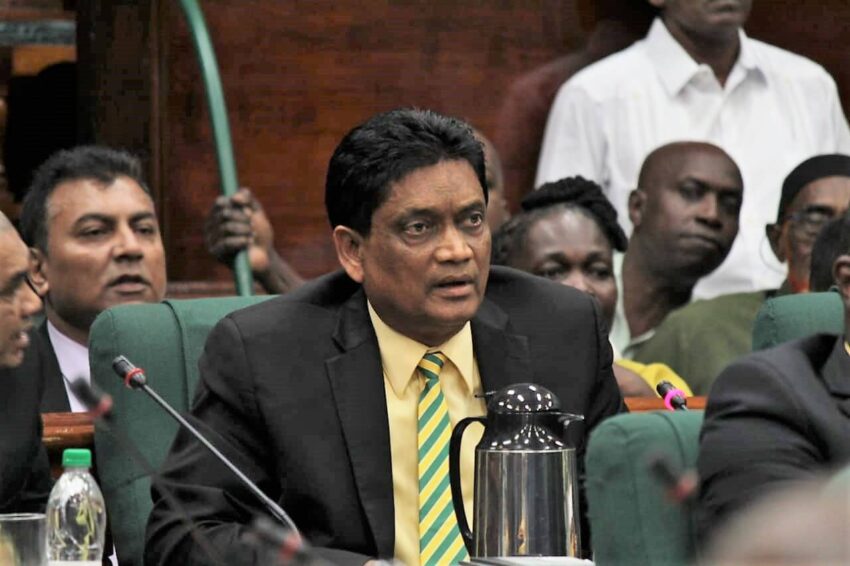(GUYANA CHRONICLE) – Government has compiled a number of compelling arguments to prove that the no-confidence motion, though declared ‘passed’, is null, void, and of no effect on the basis that the opposition did not secure a majority in the National Assembly; and the voting process was further compromised by the involvement of an individual who holds allegiance to a foreign power.
The A Partnership for National Unity + Alliance for Change (APNU+AFC) Government finalized its position approximately one week after the no-confidence motion, filed by the Leader of the Opposition Bharrat Jagdeo, was declared passed by Speaker of the National Assembly, Dr. Barton Scotland during the 111th Sitting of the National Assembly on December 21, 2018.
For more than six hours, political heavyweights from both sides of the House debated the motion, and when it was finally put to a vote, AFC back-bencher Charrandass Persaud broke ranks and voted in favour of the motion to bring down his government. The Clerk of the National Assembly Sherlock Isaacs recorded the result of the vote as 33 for the motion of no confidence and 32 against the motion. He subsequently signed Resolution No. 101 as passed by the National Assembly on December 21, 2018 which resolved that “This National Assembly has no confidence in the government.”
But the government is arguing that there was a misrepresentation of what constitutes a majority in the 65-Member National Assembly.
In a report submitted to the Speaker and Cabinet, Attorney General and Legal Affairs Minister, Basil Williams submitted that there was a miscalculation of the majority of all elected members as required under Article 106(6) of the Constitution for the government to be defeated on a vote of no confidence.
“In order for the government to be defeated on a vote of confidence, 34 or more votes of all the elected members in favor of the motion was required instead of 33. This assertion is grounded in established parliamentary precedent and practice and case law in the Commonwealth,” the report, which was leaked to Guyana Chronicle, read.
It said the matter now brings into question several critical legal issues for consideration by the Speaker. Among the questions are: (1) “whether 33 votes in favor of the motion of no confidence amounted to a majority of all elected members in accordance with Article 106 (6) of the Constitution?” and secondly, “whether Resolution 101 is constitutional and effective and passed in accordance Article 106 (6) of the Constitution?”
Article 106 (6) of the Constitution of the Cooperative Republic of Guyana states that: “The Cabinet including the President shall resign if the government is defeated by the vote of a majority of all the elected members of the National Assembly on a vote of confidence.”
Distinct
In the report, the attorney general explained that “the constitutional requirement for voting on a motion of no-confidence is distinct from voting on the passage of legislation and ordinary motions in Parliament.”
It was noted that the framers of the Constitution, by requiring the vote of a majority of all the elected members of the National Assembly, have set the requirement as an absolute majority.
“The passage of legislation and motions outside of article 106 (6) procedurally only requires a vote of those members present and voting. By way of example, Article 168 of the Constitution deals with voting on motions generally and provides that ‘Save as otherwise provided by this Constitution, all questions proposed for decision in the National Assembly shall be determined by a majority of the votes of the members present and voting.’
“Therefore, it is clear that the intention of Article 106 (6) is that there must be a majority of ‘all the elected members of the National Assembly’ as a vote of confidence falls outside the ambit of article 168,” the attorney general explained in his report.
In building his case, he pointed to the legal meaning of a majority, which according to the Merriam Webster Dictionary (1828) is a number greater than half.

“A political principle providing that a majority usually constituted by fifty per cent plus one of an organised group will have the power to make decisions binding upon the whole” – majority as defined by the Merriam Webster Dictionary.
According to the attorney general, the case of Kilman Kilman v Speaker of Parliament of the Republic of Vanuatu [2011] VUCA 15; Civil Appeal 09 of 2011 (13 May 2011) validates and subscribes to the definition of a majority.
The case determined the validity of the Speaker’s ruling upon a motion of no-confidence where the votes were closely divided. The court in delivering its decision said:
“The present case illustrates the context of a dispute when the votes are close to evenly divided numbers. Parliament consists of 52 members which is an even number of members. If 26 members voted for the motion of no confidence, and 26 others voted against the motion, the motion is not passed by a majority of the Members of Parliament within the meaning of Article 43(2) of the Constitution. If the motion receives at least one half plus one, it receives a majority of the members of Parliament. Again this is what the constitutional framers intended in the interest of stable governments.”
In the case of Guyana, Williams reminded that the National Assembly comprises 65 members, and mathematically, half of all the elected members would result in a fraction of 32.5.
“There are judicial authorities in the Commonwealth to show that where a number results in a fraction, the next highest whole number would represent the majority. In the instant case as half of 65 results in the fraction of 32.5, that figure should then be rounded to the next whole number being 33 which would now represent half of the elected members. In accordance with practice application of the meaning of majority means that ‘1’ must now be added to ‘33’ to calculate a majority,” he argued.
As such, the government is maintaining that the majority legally required in Article 106(6) of the Constitution for a vote of no confidence to pass is 34 or more of all elected members of the National Assembly.
The rounding up of the fraction formula was the manner of calculation used by the Speaker of the Anguilla House of Assembly in determining matters of quorum as pointed out in the case of Hughes v Rogers Civil Suits No. 99 & 101 of 1999 High Court of Anguilla January 12, 2000.
Persaud’s Legitimacy
Another argument being put on the table by the government is Charrandass Persaud’s legitimacy as a Member Parliament before his expulsion from the AFC and by extension government.
According to Article 155 (1) (a) of the Constitution, “no person shall be qualified for election as a member of the National Assembly who: is by virtue of his or her own act, under any acknowledgement of allegiance, obedience or adherence to a foreign power or state.”
Williams said evidence shows that Persaud held a passport and possessed the rights and obligations as a citizen of Canada which is a foreign power from nomination day of the last General and Regional Elections in 2015, including and up to the time of voting upon the motion of no-confidence.

He said the case of Dabdoub, Abraham v Daryl Vaz, Carlton Harris & Attorney General Claim No. 2007 HCV 03921 illustrates the principle that a person who has taken positive steps to acquire citizenship by applying for citizenship in a foreign State is deemed to be disqualified to be elected as a member of the National Assembly.
“It is not the owing of allegiance to the foreign State by virtue of being a citizen of that country that is a ground for disqualification from sitting in the National Assembly but rather the voluntary taking of steps to acknowledge that citizenship that causes the disqualification,” the attorney general explained in his report.
It was noted that Persaud by virtue of his Canadian citizenship was disqualified to be elected a Member of the National Assembly of Guyana and had no legal right to vote as an elected member of the House.
“The vote of ‘Yes’ by Mr. Persaud in favour of the motion of no confidence on the 21st day of December, 2018 in the National Assembly on the 21st December, 2018 is null and void and cannot be counted as a vote of an elected member of the National Assembly,” Williams said.
On the basis of these three arguments, and an additional three, the Speaker will be invited to reverse the ruling issued on December 21, 2018.
For more news visit stlucianewsonline.com to stay updated.













